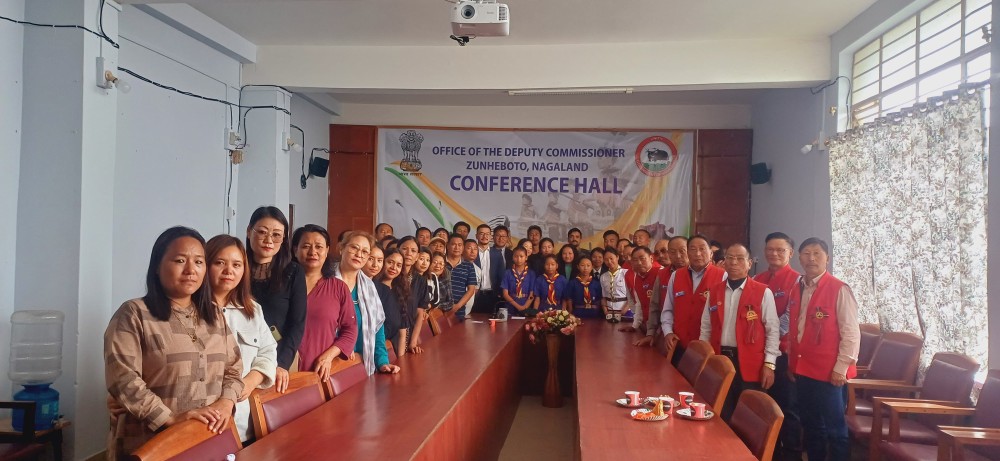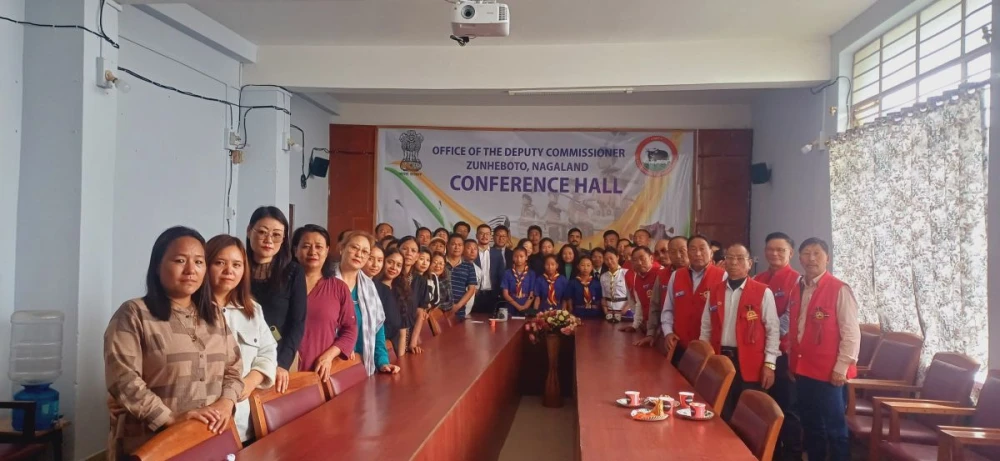Major Praveen Solotra, RO I/C of the 11 Battalion Assam Rifles, Zunheboto, along with government officials, CSOs, educators, students, and security personnel on June 25. (Morung Photo)

KOHIMA/DIMAPUR/ZUNHEBOTO, JUNE 25 (MExN): Nagaland joined the rest of the country in observing Samvidhan Hatya Diwas on Wednesday, marking the 50th anniversary of the imposition of Emergency in India in 1975. Various commemorative programmes were held across the state, reflecting on what has been widely described as one of the darkest chapters in India’s democratic history.
At the Nagaland Civil Secretariat in Kohima, Advisor for Art & Culture and Treasuries & Accounts, K. Konngam Konyak, said the day served as a reminder of the importance of safeguarding civil liberties and democratic values. Highlighting the events of 1975, he said that normal democratic processes were suspended, the press was censored, and thousands of political opponents were detained.
Konyak underlined the resilience of Indian democracy, noting that the peaceful transition of power in 1977 reaffirmed the people’s ultimate sovereignty. He said the day held special significance for Nagaland, a region that has long grappled with balancing security concerns and constitutional freedoms.
Delivering the keynote address, Dr. Konei Nakhro, Associate Professor at Kohima College, said that the relevance of the Emergency lies not in nostalgia but in democratic responsibility. Referring to the recent ethnic conflict in Manipur, she warned against complacency and stressed the role of every citizen in preserving the spirit of the Constitution.
An exhibition organised by the Department of Information & Public Relations showcased photographs and documents from the Emergency era. Commissioner & Secretary for Art & Culture, Sthel O Lotha, IAS, delivered the vote of thanks. The event also featured a patriotic song by Government High School, PWD Colony, Kohima.

In Zunheboto, a district-level observance was held at the Deputy Commissioner’s conference hall. Nisana T Zhimo, Assistant Professor at Zunheboto Government College, in her address, said the Emergency saw the suspension of civil liberties and imprisonment of political opponents, students, and activists. She described the period as a constitutional breakdown that tested the nation’s democratic fabric.
Major Praveen Solotra, Officer-in-Charge of the 11th Battalion Assam Rifles, stressed the importance of historical reflection, stating that understanding past mistakes is crucial to safeguarding democracy. He called for greater focus on education and economic empowerment to build a resilient and informed society.
The programme was chaired by EAC Zuchibemo Ezung and included patriotic songs, welcome and vote of thanks from fellow officers, and concluded with the National Anthem.
In Dimapur, Pranab Vidyapith Higher Secondary School held a commemorative programme in line with the NBSE directive. Students from Classes 11 and 12 (Arts stream) delivered impactful speeches on the Emergency and the erosion of democratic rights during that time. School Principal Monoj Bhattacharjee urged students to uphold the principles of civil liberty and freedom of expression. Certificates were distributed to participants at the end of the programme.
In Chümoukedima, the Bharatiya Janata Yuva Morcha (BJYM) Nagaland organised a Mock Parliament session at Mount Mary College as part of the commemoration. BJP national vice president and former state president, M Chuba Ao, said the 1975 Emergency was a dark chapter in India’s democratic history. He recounted that the period divided the country politically and led to the suppression of media, rights, and civil freedom.
Ao also reflected on the broader challenges of governance in a diverse and complex country like India. Speaking on the Naga political issue, he expressed optimism for a negotiated solution while acknowledging its complexity.
The event included a simulated parliamentary session where students actively engaged in debates and legislative processes. BJYM officials, including state president Hinoka Chophi and secretary Niuto Murumi, were present at the programme.
Across the state, the observance of Samvidhan Hatya Diwas served as a moment of reflection on past political challenges, and a reaffirmation of the need to uphold India’s constitutional and democratic values.






